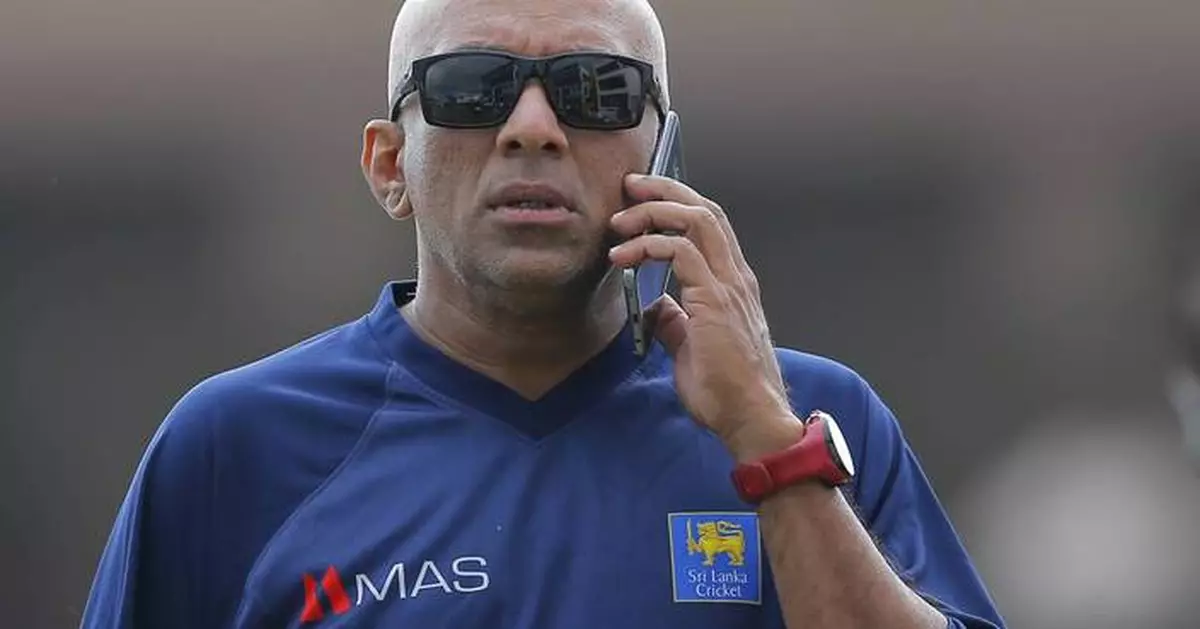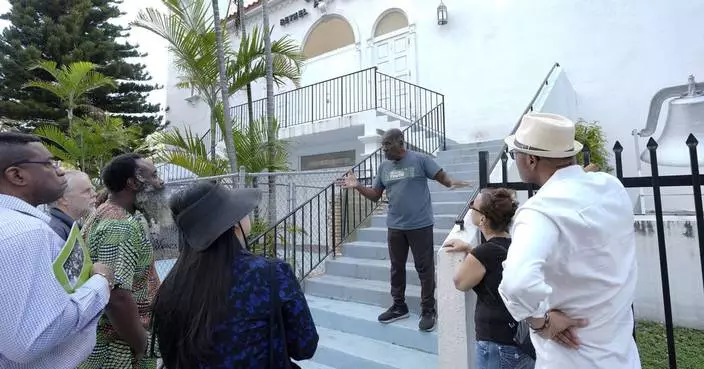DHAKA, Bangladesh (AP) — The Bangladesh Cricket Board fired national team coach Chandika Hathurusinghe on Tuesday for allegedly assaulting one of his players during last year’s 50-over World Cup in India.
“Hathurusinghe has two counts of misconduct,” BCB president Faruque Ahmed said Tuesday. “First is about an assault on a player. Secondly, he took too many leaves, more than what was in his contract.”
Ahmed said the board served notice to the Sri Lankan and suspended him for 48 hours after which his contract will be terminated.
“His suspension is for a 48-hour notice period, which we are not bound to give him, but we did it out of courtesy as he is an international figure,” Ahmed said. “We have suspended him, and with immediate effect afterwards he will be terminated.”
Former West Indies cricketer Phil Simmons, who has led Zimbabwe, Ireland, West Indies and Afghanistan as head coach in the past, will replace Hathurusinghe until the Champions Trophy in February next year.
The board did not give details of the alleged assault with some media reports saying Hathurusinghe had hit the player in question.
“The victim is not very comfortable about it, I will not mention his name,” Ahmed said. “This incident shouldn’t have happened.”
Ahmed also said Hathurusinghe's absences exceeded three months, which “is also large part of his misconduct.”
“He informed us in a scattered way, in one or two emails, that he has to go home,” Ahmed said. “It can’t be for more than three months … so there was a serious breach in that regard.”
Hathurusinghe was appointed Bangladesh coach last year. Bangladesh recorded its most significant away win in test history when it routed Pakistan 2-0 in the two-match series. But soon after Bangladesh crashed to a 2-0 test series defeat in India and also lost the T20 series 3-0 last month.
Hathurusinghe has made no public comment.
AP cricket: https://apnews.com/hub/cricket
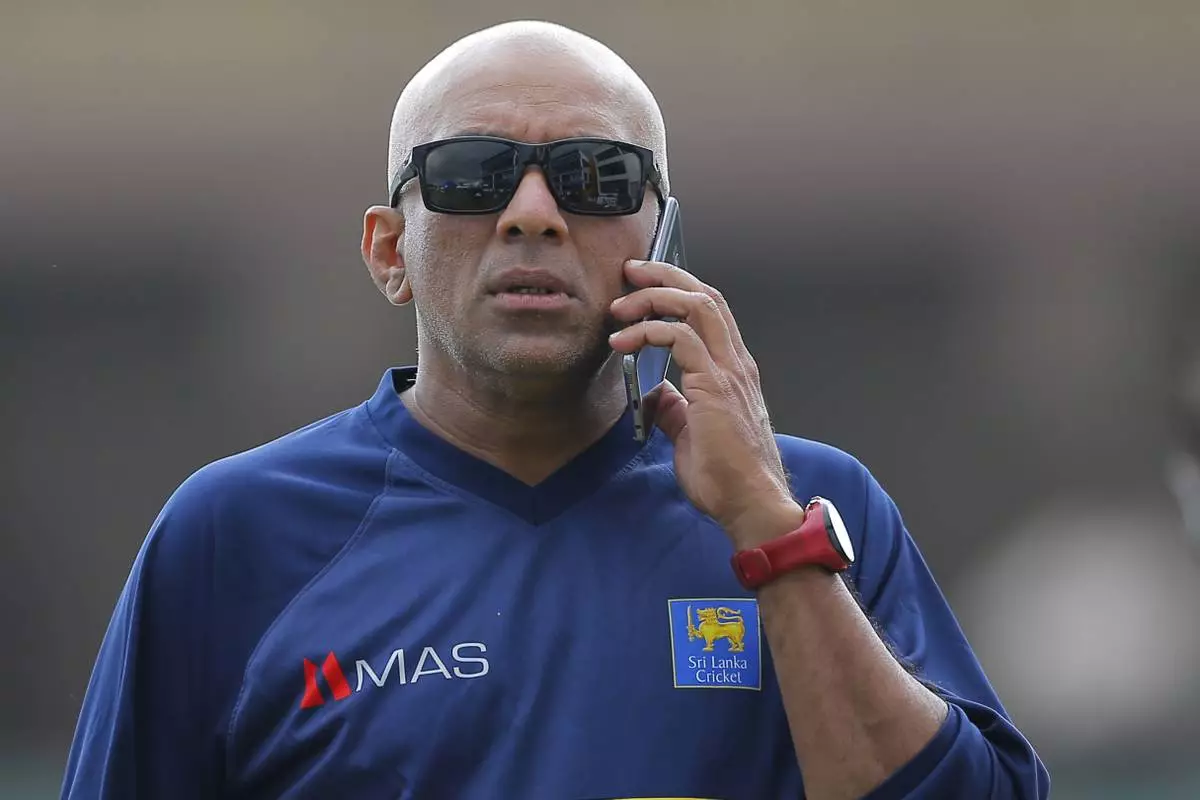
FILE - Sri Lanka's coach Chandika Hathurusinghe speaks from a mobile phone before a practice session ahead of the first test cricket match against South Africa in Galle, Sri Lanka, Wednesday, July 11, 2018. (AP Photo/Eranga Jayawardena, File)
MAGDEBURG, Germany (AP) — Germans began Saturday mourning another violent attack and their shaken sense of security after a Saudi doctor drove a black BMW into a Christmas market teeming with holiday shoppers on Friday evening, killing at least two people, including a small child, and injuring at least 60 others in what authorities called a deliberate attack.
Authorities identified the suspect as a 50-year-old who has been living in Germany for nearly two decades and practicing medicine there. He was arrested Friday evening at the site of the attack as medical officials tended to the injured, and was taken into custody for questioning.
But on Saturday there were still no answers as to what caused the man to drive into a crowd in the eastern Germany city of Magdeburg.
The violence shocked the country and the city, bringing its mayor to the verge of tears and marring a festive event that’s part of a centuries-old German tradition. It prompted several other German towns to cancel their weekend Christmas markets as a precaution and out of solidarity with Magdeburg’s loss.
Chancellor Olaf Scholz and Interior Minister Nancy Faeser were due to travel to Magdeburg on Saturday, and a memorial service is to take place in the city cathedral in the evening.
“My thoughts are with the victims and their relatives," Scholz wrote on X. "We stand beside them and beside the people of Magdeburg.”
Magdeburg is a city of about 240,000 people, west of Berlin, that serves as Saxony-Anhalt’s capital. Friday’s attack came eight years after an Islamic extremist drove a truck into crowded Christmas market in Berlin, killing 13 people and injuring many others. The attacker was killed days later in a shootout in Italy.
Verified bystander footage distributed by the German news agency dpa showed the suspect’s arrest at a tram stop in the middle of the road. A nearby police officer pointing a handgun at the man shouted at him as he lay prone, his head arched up slightly. Other officers soon arrived and took the man into custody.
The two people confirmed dead were an adult and a toddler, but officials said additional deaths couldn't be ruled out because 15 people had been seriously injured.
“As things stand, he is a lone perpetrator, so that as far as we know there is no further danger to the city," Saxony-Anhalt's governor, Reiner Haseloff, told reporters. “Every human life that has fallen victim to this attack is a terrible tragedy and one human life too many.”
Authorities identified the suspect as a 50-year-old Saudi doctor who moved to Germany in 2006 and who had been practicing medicine in Bernburg, about 40 kilometers (25 miles) south of Magdeburg.
Saudi Arabia’s foreign ministry condemned the attack on X but did not mention the suspect’s connection to the kingdom.
Christmas markets are a German holiday tradition cherished since the Middle Ages, now successfully exported to much of the Western world.
Hours after Friday's tragedy, the wail of sirens clashed with the market’s festive ornaments, stars and leafy garlands.
Magdeburg resident Dorin Steffen told dpa that she was at a concert in a nearby church when she heard the sirens. The cacophony was so loud “you had to assume that something terrible had happened.”
She called the attack “a dark day” for the city.
“We are shaking,” Steffen said. “Full of sympathy for the relatives, also in the hope that nothing has happened to our relatives, friends and acquaintances.”
The attack reverberated far beyond Magdeburg, with Haseloff calling it a catastrophe for the city, state and country. He said flags would be lowered to half-staff in Saxony-Anhalt and that the federal government planned to do the same.
“It is really one of the worst things one can imagine, particularly in connection with what a Christmas market should bring," the governor said.
Moulson reported from Berlin.

Security guards stand in front of a cordoned-off Christmas Market after a car crashed into a crowd of people, in Magdeburg, Germany, Saturday, Dec. 21, 2024. (AP Photo/Ebrahim Noroozi)

Emergency services work in a cordoned-off area near a Christmas Market, after a car drove into a crowd in Magdeburg, Germany, Saturday, Dec. 21, 2024. (AP Photo/Ebrahim Noroozi)

Emergency services work in a cordoned-off area near a Christmas Market, after a car drove into a crowd in Magdeburg, Germany, Friday, Dec. 20, 2024. (AP Photo/Ebrahim Noroozi)

Emergency services work in a cordoned-off area near a Christmas Market, after a car drove into a crowd in Magdeburg, Germany, Friday, Dec. 20, 2024. (AP Photo/Ebrahim Noroozi)

Reiner Haseloff, Minister President of Saxony-Anhalt, center, is flanked by Tamara Zieschang, Minister of the Interior and Sport of Saxony-Anhalt, left, and Simone Borris, Mayor of the City of Magdeburg, at a press conference after a car plowed into a busy outdoor Christmas market in Magdeburg, Germany Friday, Dec. 20, 2024. (Hendrik Schmidt/dpa via AP)
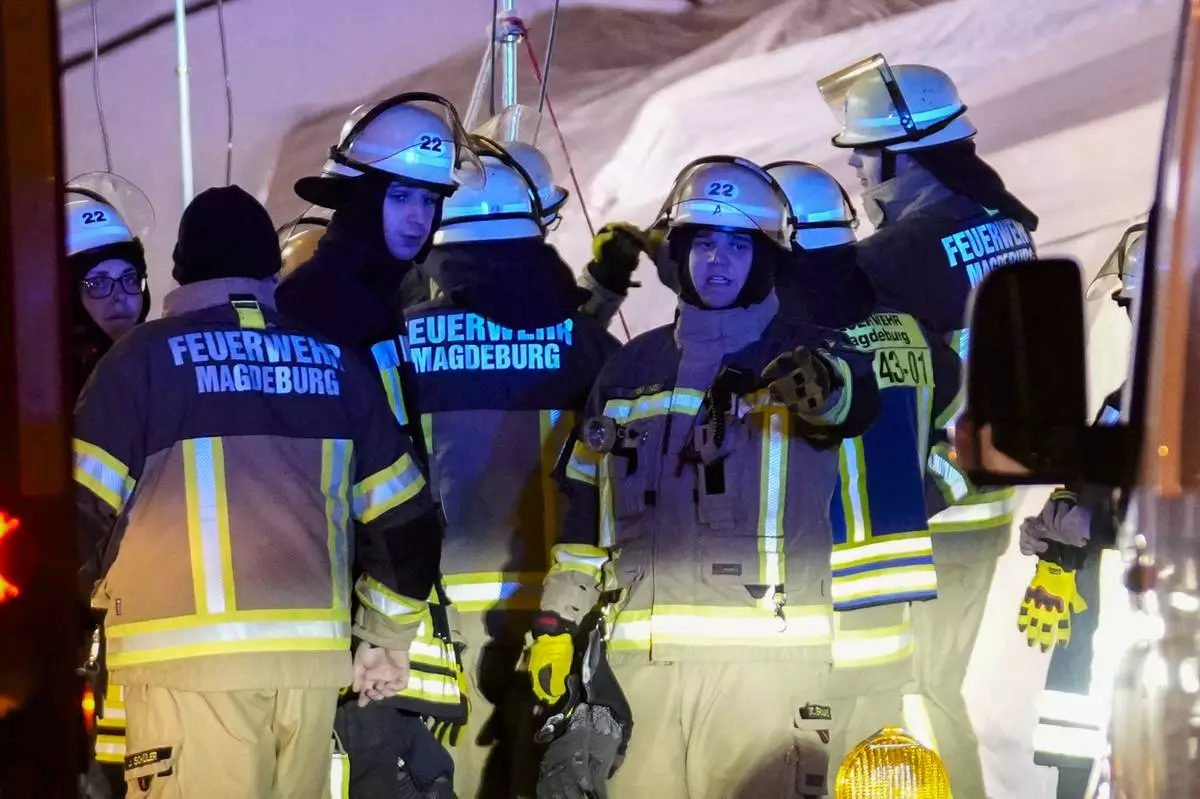
Emergency services work in a cordoned-off area near a Christmas Market, after a car drove into a crowd in Magdeburg, Germany, Friday, Dec. 20, 2024. (AP Photo/Ebrahim Noroozi)

Emergency services work in a cordoned-off area near a Christmas Market, after a car drove into a crowd in Magdeburg, Germany, Friday, Dec. 20, 2024. (AP Photo/Ebrahim Noroozi)
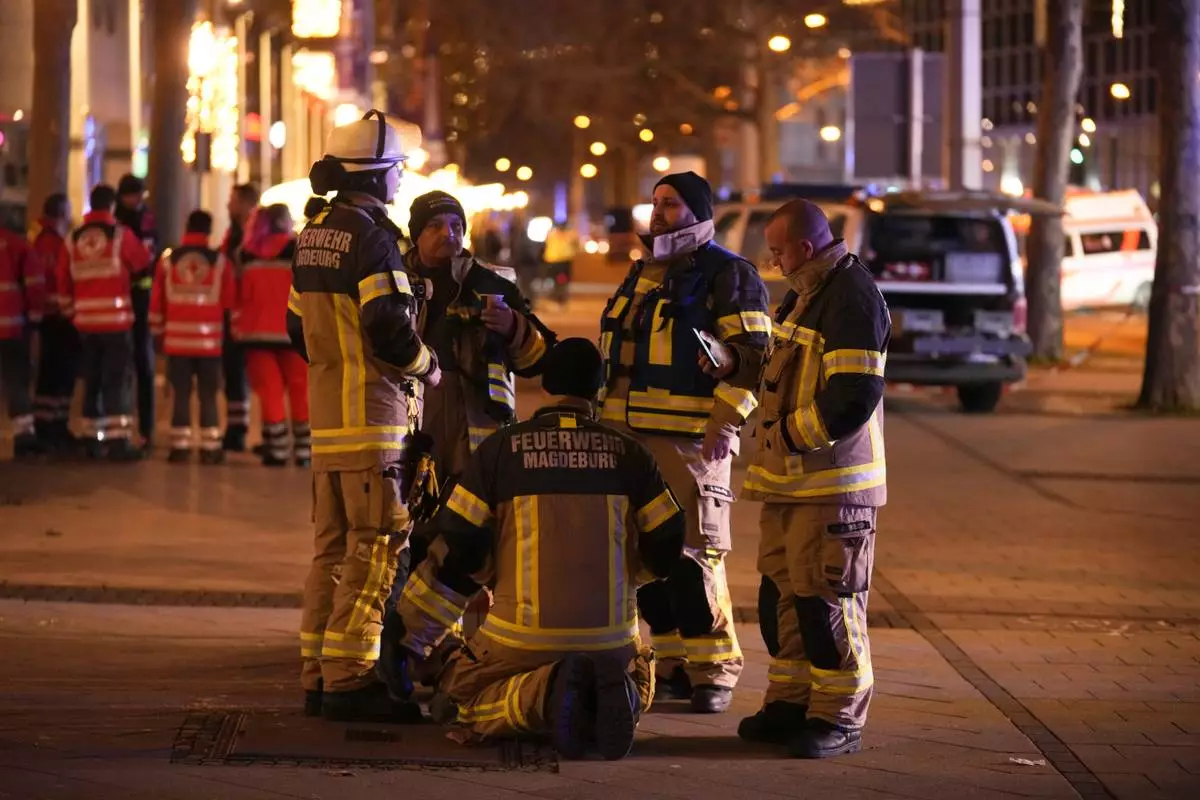
Emergency services work in a cordoned-off area near a Christmas Market, after a car drove into a crowd in Magdeburg, Germany, Friday, Dec. 20, 2024. (AP Photo/Ebrahim Noroozi)

A police officer guards at a blocked road near a Christmas Market, after an incident in Magdeburg, Germany, Friday, Dec. 20, 2024. (AP Photo/Ebrahim Noroozi)

Emergency services attend an incident at the Christmas market in Magdeburg, Germany, Friday Dec. 20, 2024. (Dörthe Hein/dpa via AP)

Emergency services attend an incident at the Christmas market in Magdeburg, Germany, Friday Dec. 20, 2024. (Heiko Rebsch/dpa via AP)

Emergency services attend an incident at the Christmas market in Magdeburg, Germany, Friday Dec. 20, 2024. (Heiko Rebsch/dpa via AP)

A police officer guards at a cordoned-off area near a Christmas Market after an incident in Magdeburg, Germany, Friday, Dec. 20, 2024. (AP Photo/Ebrahim Noroozi)
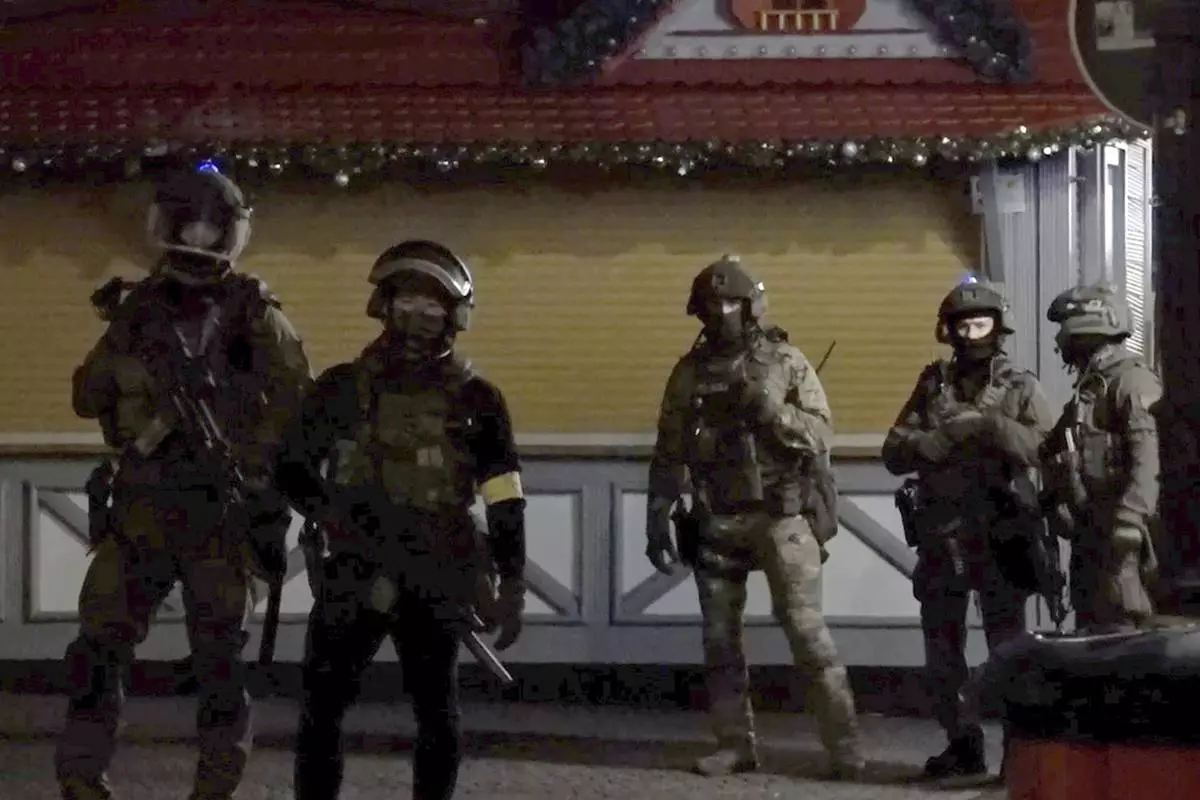
In this screen grab image from video, special police forces attend an incident at the Christmas market in Magdeburg, Germany, Friday Dec. 20, 2024. (Thomas Schulz/dpa via AP)

Reiner Haseloff (M, CDU), Minister President of Saxony-Anhalt, makes a statement after an incident at the Christmas market in Magdeburg, Germany, Friday Dec. 20, 2024. (Heiko Rebsch/dpa via AP)

A police officer speaks with a man at a cordoned-off area near a Christmas Market after an incident in Magdeburg, Germany, Friday, Dec. 20, 2024. (AP Photo/Ebrahim Noroozi)

A policeman is seen at the Christmas market where an incident happened in Magdeburg, Germany, Friday Dec. 20, 2024. (Heiko Rebsch/dpa via AP)

A firefighter walks through a cordoned-off area near a Christmas Market, after a car drove into a crowd in Magdeburg, Germany, Saturday, Dec. 21, 2024. (AP Photo/Ebrahim Noroozi)

Emergency services work in a cordoned-off area near a Christmas Market, after an incident in Magdeburg, Germany, Friday, Dec. 20, 2024. (AP Photo/Ebrahim Noroozi)

A view of the cordoned-off Christmas market after an incident in Magdeburg, Germany, Friday Dec. 20, 2024. (Heiko Rebsch/dpa via AP)

A police officer guards at a blocked road near a Christmas market after an incident in Magdeburg, Germany, Friday, Dec. 20, 2024. (AP Photo/Ebrahim Noroozi)

The car that was crashed into a crowd of people at the Magdeburg Christmas market is seen following the attack in Magdeburg, Germany, Saturday early morning, Dec. 21, 2024. (AP Photo/Ebrahim Noroozi)
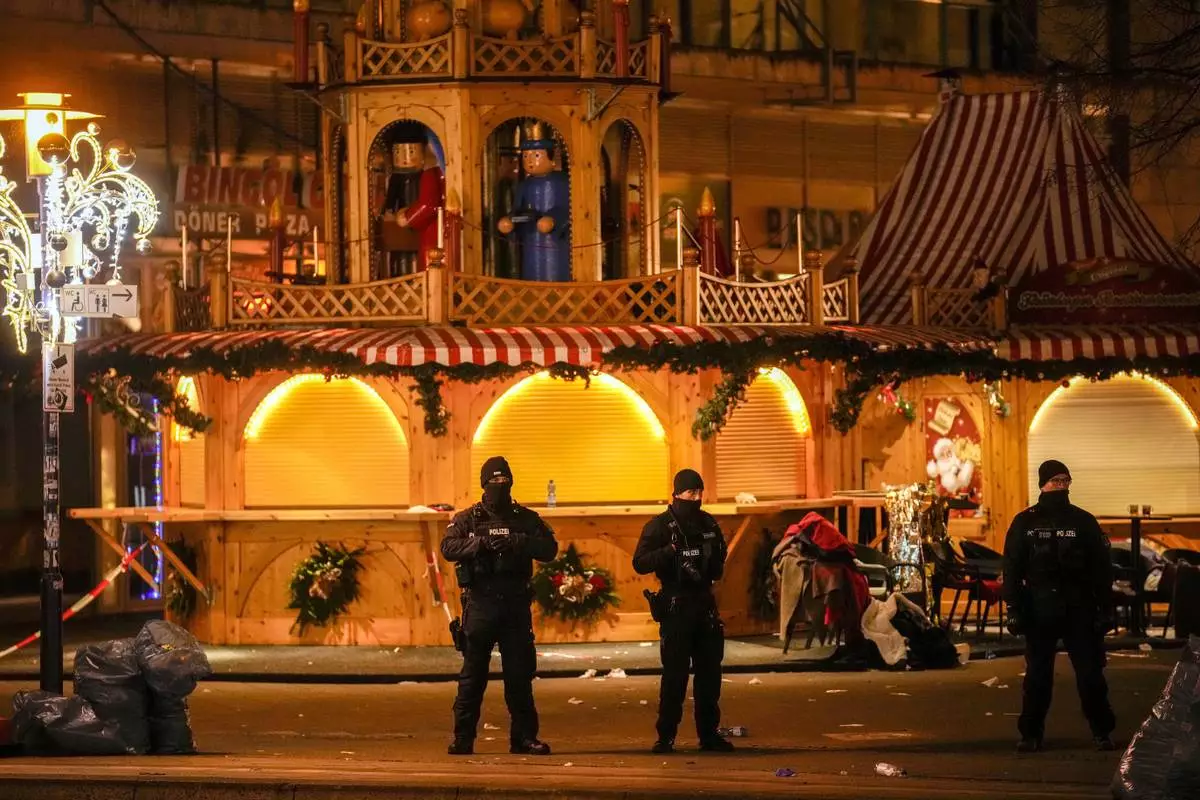
Security guards stand in front of a cordoned-off Christmas Market after a car crashed into a crowd of people, in Magdeburg, Germany, Saturday early morning, Dec. 21, 2024. (AP Photo/Ebrahim Noroozi)
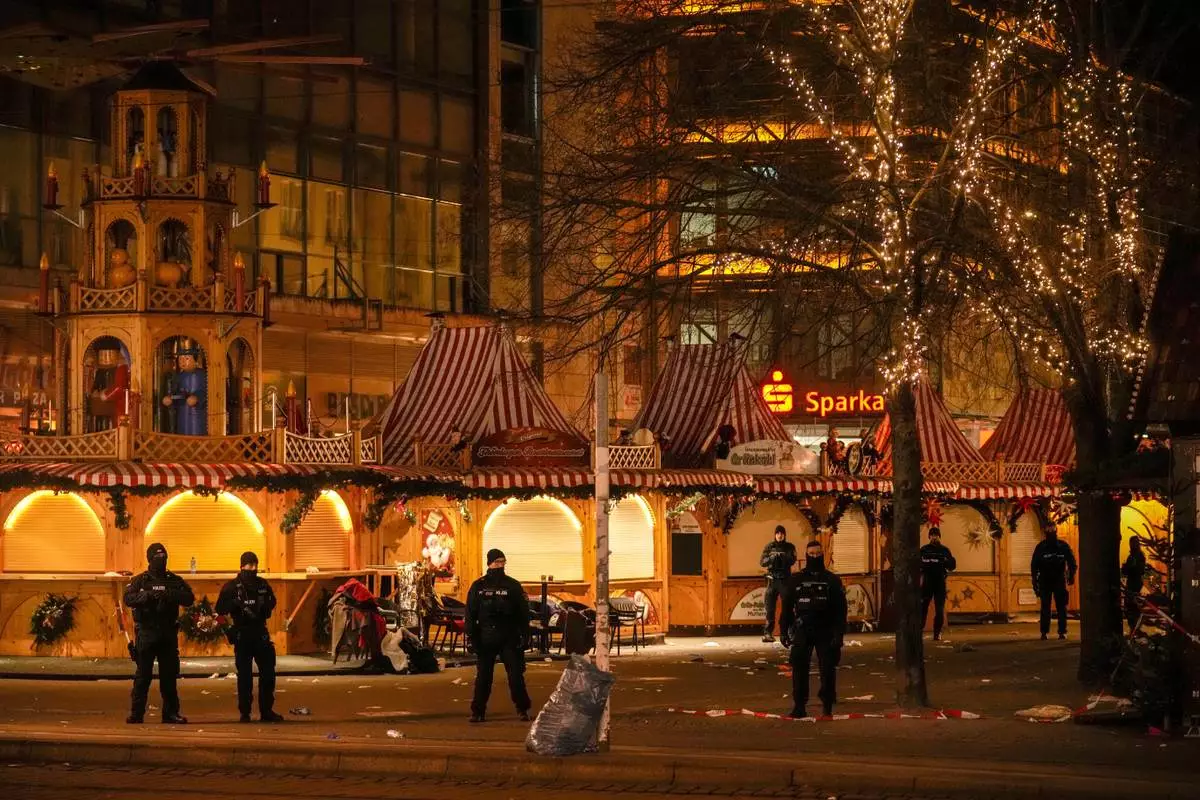
Security guards stand in front of a cordoned-off Christmas Market after a car crashed into a crowd of people, in Magdeburg, Germany, Saturday early morning, Dec. 21, 2024. (AP Photo/Ebrahim Noroozi)

The car that was crashed into a crowd of people at the Magdeburg Christmas market is seen following the attack in Magdeburg, Germany, Saturday early morning, Dec. 21, 2024. (AP Photo/Ebrahim Noroozi)

Forensics work on a damaged car sitting with its doors open after a driver plowed into a busy Christmas market in Magdeburg, Germany, early Saturday, Dec. 21, 2024. (Hendrik Schmidt/dpa via AP)



